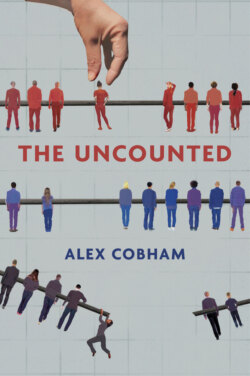Читать книгу The Uncounted - Alex Cobham - Страница 9
Notes
Оглавление1 1. Michel Foucault, 1995, Discipline and Punish: The Birth of the Prison, New York: Random House (2nd ed.), p. 194.
2 2. James C. Scott, 1998, Seeing Like a State: How Certain Schemes to Improve the Human Condition Have Failed, London: Yale University Press, pp. 345–346.
3 3. Alain Desrosières, 2001, ‘How “real” are statistics? Four possible attitudes’, Social Research 68, pp. 339–355.
4 4. Desrosières, ‘How “real” are statistics?’, p. 340.
5 5. Wendy Espeland and Mitchell Stevens, 2008, ‘A sociology of quantification’, European Journal of Sociology XLIX (3), pp. 401–436: p. 431.
6 6. Theodore Porter terms as ‘funny numbers’, the problem that power distorts: those that are both responsible for creating statistics, and judged upon resulting metrics, face a conflict of interest that is unlikely to give rise to good data. Theodore Porter, 2012, ‘Funny numbers’, Culture Unbound 4, pp. 585–598.
7 7. Sakiko Fukuda-Parr and Desmond McNeill, 2019, ‘Knowledge and politics in setting and measuring the SDGs: Introduction to special issue’, Global Policy 10(S1), pp. 5–15.
8 8. William Seltzer and Margo Anderson, 2001, ‘The dark side of numbers: The role of population data systems in human rights abuses’, Social Research 68(2), pp. 481–513.
9 9. Not unrelated is the idea of resistance to the set of identification possibilities that census enumeration may require – perhaps most famously, the objection to a particular categorization by insisting on ‘Jedi’ as a religious identification.
10 10. Marco Deseriis, 2015, Improper Names: Collective Pseudonyms from the Luddites to Anonymous, London: Minnesota University Press, p. 4.
11 11. Compare Muchiri Karanja, 2010, ‘Myth shattered: Kibera numbers fail to add up’, Daily Nation, 3 September: https://www.nation.co.ke/News/Kibera%20numbers%20fail%20to%20add%20up/-/1056/1003404/-/13ga38xz/-/index.html; and Paul Currion, 2010, ‘Lies, damned lies and you know the rest’, humanitarian.info, 13 September: https://web.archive.org/web/20120803154806/http://www.humanitarian.info/2010/09/13/lies-damned-lies-and-you-know-the-rest/; with, e.g., Martin Robbins, 2012, ‘The missing millions of Kibera: Africa’s propaganda trail’, Guardian, 1 August: https://www.theguardian.com/science/the-lay-scientist/2012/aug/01/africa-propaganda-kibera.
12 12. See, e.g., Duncan Green, 2010, ‘Are women really 70% of the world’s poor? How do we know?’, From Poverty to Power, 3 February: https://oxfamblogs.org/fp2p/are-women-really-70-of-the-worlds-poor-how-do-we-know/ (and the many valuable comments); and Philip Cohen, 2013, ‘“Women own 1% of world property”: A feminist myth that won’t die’, The Atlantic, 8 March: https://www.theatlantic.com/sexes/archive/2013/03/women-own-1-of-world-property-a-feminist-myth-that-wont-die/273840/. As an antidote reflecting the state of research beforehand, see Carmen Diana Deere and Cheryl Doss, 2008, ‘The gender asset gap: What do we know and why does it matter?’, Feminist Economics 12(1–2): https://doi.org/10.1080/13545700500508056; see also the whole special issue which it introduces.
13 13. James Baldwin, 1962, ‘As much truth as one can bear’, New York Times, 14 January: https://www.nytimes.com/1962/01/14/archives/as-much-truth-as-one-can-bear-to-speak-out-about-the-world-as-it-is.html.
14 14. On which the investigative work of Carole Cadwalladr at the Guardian has been invaluable.
15 15. Ben Goldacre, 2012, Big Pharma, London: Fourth Estate.
16 16. Cathy O’Neil, 2016, Weapons of Math Destruction: How Big Data Increases Inequality and Threatens Democracy, London: Allen Lane.
17 17. Tax Justice Network, 2015, The Offshore League: https://www.taxjustice.net/about/theoffshoregame/.
18 18. William Bruce Cameron, 1963, Informal Sociology: A Casual Introduction to Sociological Thinking, New York: Random House, p. 13. A quotation often, although apparently erroneously, attributed to Albert Einstein: http://quoteinvestigator.com/2010/05/26/everything-counts-einstein/.
